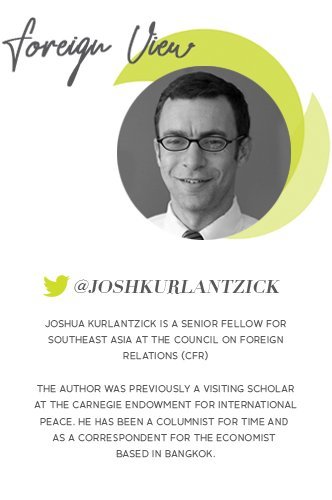
- –“free from coercion by other nations” as well as free “in terms of values and belief systems”
- –“individual rights and liberties” including religious freedom and good governance
- –“the shared values of the United Nations Charter and the Universal Declaration of Human Rights”
- –“all nations should enjoy unfettered access to the seas and airways upon which our nations and economies depend”
- –“open investment environments, transparent agreements between nations, protection of intellectual property rights, fair and reciprocal trade”
You can read Alyssa’s analysis of the FOIP, from which this summary is excerpted here.
So far, the Jokowi government has not been particularly enthusiastic about the Free and Open Indo-Pacfic idea, even as some other Southeast Asian states, like Singapore and Vietnam, have been more willing to embrace the concept, which originally began as a Japanese conception of regional strategy. The Jokowi administration now has its own, ASEAN-based idea of an Indo-Pacific regional strategy, the so-called “Indo-Pacific Outlook,” which has emerged in the past year.
As Evan Laksmana notes, the Jokowi administration’s regional concept, the Indo-Pacific Outlook, which it is promoting to states in the region, is much more focused on multilateralism, inclusiveness, and ASEAN as the regional center, than the Free and Indo-Pacific idea. Indeed, the Jokowi administration sees ASEAN as the core of regional security. For its part, the Free and Open Indo Pacific strategy generally prioritizes bilateral ties over multilateralism, has little to say about ASEAN, is focused almost exclusively on security issues, and could be viewed as a means of rallying partners in Asia against China. Being seen to be uniting against Beijing is an uncomfortable position for even the staunchest U.S. partners, like Singapore, to put themselves in; Indonesia is even more reluctant to take part in what could be viewed as a binary concept that pits countries against China.
On economic issues, meanwhile, the U.S.-Indonesia relationship continues to underperform what should be more robust trade ties, given the size of the two economies and the growing, vibrant consumer market in Indonesia. On a visit to the United States last year, Trade Minister Enggartiasto Lukita met with U.S. Commerce Secretary Wilbur Ross, and the two sides agreed to create a broad plan to nearly double bilateral trade in the next few years. But that plan will be tough to put into action; the White House continues to review GSP trade status for many trading partners, including Indonesia, and any major changes in Indonesia’s GSP status could badly undermine economic ties. What’s more, overall U.S-China trade tensions also could broadly depress growth in Asia and hurt the U.S.-Indonesia economic relationship, although Indonesia is not as exposed to regional trade tensions as economies like Singapore.
After Indonesia’s presidential elections, might the U.S.-Indonesia relationship change? It is possible, although there are only modest signs of hope no matter who wins in April. There is little prospect that Jokowi, even in a second term in which he feels more secure in his position – and even if Indonesia becomes more worried about its claims around the Natuna Islands – will embrace the relatively hard-edged Free and Open Indo-Pacific concept, one centered around the Quadrilateral Security Dialogue, which the Jokowi administration distrusts as well.
Meanwhile, there appears little reason to believe the White House will devote more resources, or time, to strengthening ASEAN, the core of the Jokowi administration’s regional approach. Partly, U.S. officials long has viewed ASEAN as ineffectual, and the organization has not shown more effectiveness in 2017 or 2018. The current White House’s general disinterest in, and distrust of, regional bodies also makes it hard to imagine Washington paying closer attention to ASEAN in 2019 or 2020. Instead, if Jokowi were to be re-elected, the two sides probably would continue to drift on regional security issues, as Jokowi pushes harder for his regional concept, although there would be some hope for enhanced U.S.-Indonesia bilateral strategic cooperation.
Meanwhile, on economic issues, continuity in Jakarta if Jokowi won might allow for breakthroughs in negotiations with Washington on GSP, and generally on plans to boost U.S.-Indonesia economic ties. But a doubling of bilateral trade is not likely anytime soon, no matter the result of the Indonesian presidential race
And if Prabowo wins? Certainly, bilateral economic relations could go even farther downhill. The White House’s reassessment of Indonesia’s GSP status, which the Jokowi administration has treated gingerly, could provoke fury in a more nationalist Prabowo administration. In addition, a mercurial Prabowo presidency might further unsettle current and potential investors in Indonesia, creating more drag on bilateral economic ties – with the United States and also with other investors like China and Singapore. On the other hand, Jokowi has pursued a relatively statist economic policy himself, and Prabowo is the type of foreign leader that U.S. president Donald Trump has gotten along with well. In addition, Prabowo is proposing large individual and corporate tax cuts similar to those passed by the Trump administration in 2017, and such cuts might be attractive to investors.
On security ties, a Prabowo presidency would be a wild card – with the United States, with other countries in Southeast Asia, and surely with China. His alleged past links to severe rights abuses would potentially complicate closer security links with the United States, as Congress in particular, which has been critical of the Indonesian armed forces’ abuses for decades, might be wary of boosting ties with Jakarta under a Prabowo presidency. On the other hand, Prabowo has generally taken a more skeptical, even harsh, view of China’s relations with Indonesia, and he might be more amenable to aligning Indonesia with the White House’s harder-line regional strategic views.

